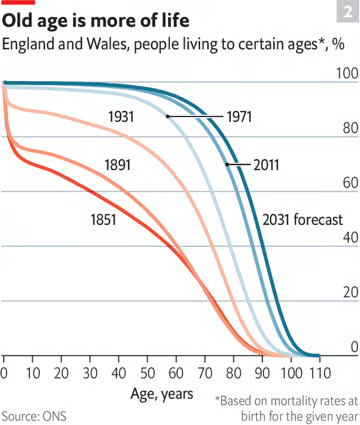“All my possessions for a moment of time.” Allegedly, these were the concluding words of Elizabeth I, the Queen of England, who was among the wealthiest women of her time. Her support for alchemists, who sought, among other things, the elixir of life, suggests a literal intent. However, her time ended in March 1603, just short of the biblical three score years and ten, deemed “the days of our years.”
Since the era of Elizabeth I, advancements have been made. In affluent societies, people can expect to live well beyond 70, and those in less prosperous nations are making progress. Since 1950, global average life expectancy has increased by 18 weeks annually.
However, there are caveats. The rise in life expectancy appears to have a ceiling. The number of centenarians is increasing, with projections of 3.7 million worldwide by 2050, but very few surpass 110, and none have verifiably exceeded 120. Additionally, “healthspan,” the duration of good health, doesn’t necessarily extend with lifespan.
Modern equivalents of Elizabeth in wealth are investing heavily in the pursuit of extending life. Individuals like Peter Thiel, Larry Page, Sergey Brin, Jeff Bezos, and Sam Altman have invested in companies aiming to prolong both lifespan and healthspan.
Beneath these high-profile investments, numerous startups are exploring potential anti-ageing solutions. The concept of extending life using available resources, alongside traditional methods like diet and exercise, is gaining traction, particularly in technologically advanced regions.
This field, while promising, is met with skepticism, as it has a history of false breakthroughs and attracts a mix of genuine and dubious players. The FDA does not classify “old age” as a disease, but evidence supporting the potential of such research is growing.
Some existing drugs have shown life-extending properties in mice, providing insights into the ageing process. Advancements in gene editing, personalized stem cells, and new diagnostic tools are contributing to the progress in longevity research.
Ageing, at its core, seems straightforward – bodies are self-repairing machines that wear out. However, evolution prioritizes reproduction over longevity, leading to the prevalence of age-related conditions. Nonetheless, research has identified genetic variants associated with longer lives, shedding light on the ageing process.
Studies have shown that centenarians possess some form of protection against diseases that affect younger elderly individuals. However, they remain susceptible to frailty and pneumonia.
The increasing understanding of the physiological aspects of ageing allows researchers to address individual components of the problem. George Church of Harvard University believes that addressing each component separately could potentially solve the ageing problem entirely.
Several groups, including Carlos López-Otín and his colleagues, have identified hallmarks of ageing that, if addressed, could theoretically extend life indefinitely. This report will focus on the progress made in addressing these hallmarks, acknowledging the complexity and interconnectedness of biology.
While oncology is a well-established field and the importance of diet, exercise, and sleep remains paramount, the focus here is on the advancements made in addressing the identified hallmarks of ageing. The biological complexity means interventions might have multiple impacts, but addressing these aspects could significantly improve lives and potentially unlock the secrets of ageing.



